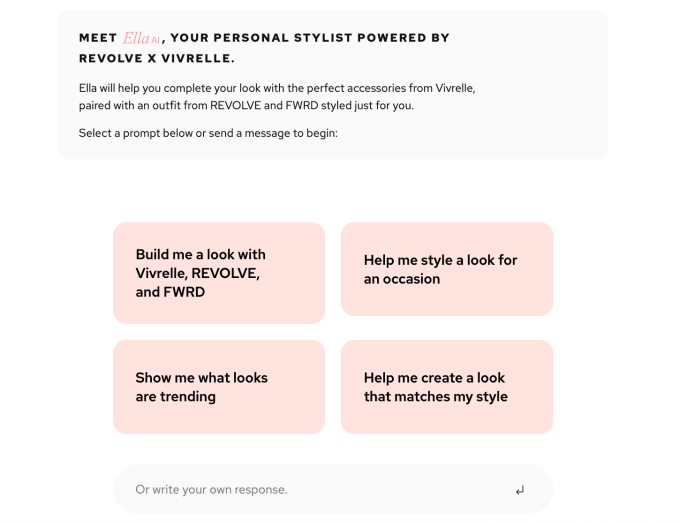Tools & Platforms
Urgent need for ‘global approach’ on AI regulation: UN tech chief

The world urgently needs to find a global approach on regulating artificial intelligence, the United Nations’ top tech chief said this week, warning that fragmentation could deepen risks and inequalities.
Doreen Bogdan-Martin, head of the UN’s International Telecommunications Union (ITU) agency, told AFP she hoped that AI “can actually benefit humanity”.
But as concerns mount over the risks posed by the fast-moving technology — including fears of mass job losses, the spread of deepfakes and disinformation, and society’s fabric fraying — she insisted that regulation was key.
“There’s an urgency to try to get… the right framework in place,” she said, stressing the need for “a global approach”.
Her comments came after US President Donald Trump this week unveiled an aggressive, low-regulation strategy aimed at ensuring the United States stays ahead of China on AI.
Among more than 90 proposals, Trump’s plan calls for sweeping deregulation, with the administration promising to “remove red tape and onerous regulation” that could hinder private sector AI development.
Asked if she had concerns about an approach that urges less, not more, regulation of AI technologies, Bogdan-Martin refrained from commenting, saying she was “still trying to digest” the US plan.
– ‘Critical’ –
“I think there are different approaches,” she said.
“We have the EU approach. We have the Chinese approach. Now we’re seeing the US approach. I think what’s needed is for those approaches to dialogue,” she said.
At the same time, she highlighted that “85 percent of countries don’t yet have AI policies or strategies”.
A consistent theme among those strategies that do exist is the focus on innovation, capacity building and infrastructure investments, Bogdan-Martin said.
“But where I think the debate still needs to happen at a global level is trying to figure out how much regulation, how little regulation, is needed,” she said.
Bogdan-Martin, who grew up in New Jersey and has spent most of her more than three-decade career at the ITU, insisted the Geneva-based telecoms agency that sets standards for new technologies was well-placed to help facilitate much-needed dialogue on the issue.
“The need for a global approach I think is critical,” she said, cautioning that “fragmented approaches will not help serve and reach all”.
As countries and companies sprint to cement their dominance in the booming sector, there are concerns that precautions could be thrown to the wind — and that those who lose the race or do not have the capacity to participate will be left behind.
– ‘Huge gap’ –
The ITU chief hailed “mind-blowing” advances within artificial intelligence, with the potential to improve everything from education to agriculture to health care — but insisted the benefits must be shared.
Without a concerted effort, there is a risk that AI will end up standing for “advancing inequalities”, she warned, cautioning against deepening an already dire digital divide worldwide.
“We have 2.6 billion people that have no access to the internet, which means they have no access to artificial intelligence”, Bogdan-Martin pointed out.
“We have to tackle those divides if we’re actually going to have something that is beneficial to all of humanity.”
Bogdan-Martin, the first woman to serve as ITU secretary-general in the organisation’s nearly 160-year history, also stressed the need to get more women into the digital space.
“We have a huge gap,” she said.
“We definitely don’t have enough women… in artificial intelligence.”
The 59-year-old mother of four said it was “a big honour” to be the first woman in her position, to be “breaking the glass ceiling (and) paving the path for future generations”.
But she acknowledged there was a lot of pressure, “not just to achieve, but to almost overachieve”.
Bogdan-Martin, who is being backed by the Trump administration to stand for re-election when her four-year mandate ends next year, said she was eager to stay on for a second term.
“There is a lot to do.”
nl/rjm/cw/tc
Tools & Platforms
Pistoia Alliance Announces Agentic AI Collaboration Initiative

Doctor technology AI integrates big data analytics with clinical research, enabling precise treatment plans tailored to individual patient needs and genetic profiles. | Image Credit: © Suriyo – stock.adobe.com
At the European conference of the Pistoia Alliance, a global nonprofit, early in 2025, a theme emerged: that agentic artificial intelligence (AI) is viewed by life sciences professionals as potentially being among the most disruptive emerging technologies over the next two to three years (1). Agentic AI has the potential, according to the Pistoia Alliance, to accelerate multi-step processes, such as target prioritization and compound optimization, by joining together reasoning, tool use, and execution.
However, the Pistoia Alliance said in a Sept. 4, 2025 press release that surrendering full autonomy to AI creates a sort of “black box” that may undermine trust, capacity for reproducibility, and regulatory compliance (1). It is for those reasons—with the overarching mission of safely adopting agentic AI—that the nonprofit is establishing a new initiative bringing together experts from the pharmaceutical, technology, and biotech industries to help shape certain standards and protocols under which AI agents will be allowed to perform.
How will the initiative encourage responsible AI use?
With Genentech providing the initial seed funding for the project, the Pistoia Alliance said it is currently seeking both additional partners and funds (1). The nonprofit has stated strategic priorities to harness AI and expedite R&D and is calling upon an AI and machine learning (ML) community of experts to continue building support for the industry-wide responsible adoption of AI.
“Our members see agentic AI as one of the most impactful technologies set to change how they work and innovate, but they also recognize the risks if adoption happens without the right guardrails,” said Becky Upton, PhD, president of the Pistoia Alliance, in the press release (1). “The Alliance is uniquely positioned to lead this work, drawing on more than eight years’ experience in pre-competitive collaboration around AI, from benchmarking frameworks for large language models to a pharmacovigilance community focused on responsible AI deployment. We know that more expert minds focused on the same topic will advance the safe and successful use of AI technologies.”
What are priorities for the industry?
As part of a recent webinar, the Pistoia Alliance said it polled more than 100 pharma professionals, and the consensus top priority for pre-competitive collaboration was the creation of shared validation frameworks and metrics, for model robustness and bias (1). Shared frameworks urgently need to be established, according to the Pistoia Alliance, for the safe adoption of AI because when evidence must be validated, auditable agent workflows that are shaped by subject matter experts and reputable data sources are necessary for the production of reliable results.
“This initiative will address the common issues we all face in integrating AI developments into a cohesive ecosystem that improves output quality,” said Robert Gill, the Agentic AI program lead at the Pistoia Alliance, in the press release (1). “It will enable members to link standalone AI applications into a dynamic network and build workflows where multiple agents can reason, plan and act together. By becoming sponsors, organizations can act as first movers—shaping the standards, gaining early access to outputs, and ensuring they are at the forefront of the next wave of AI innovation in healthcare.”
Want to make your voice heard?
Pharmaceutical Technology® Group is asking its audience within the bio/pharmaceutical industry to share their experiences in a survey that seeks perspectives on new and rapidly evolving technologies as automation, advanced analytics, digital twins, and AI (2). The survey can be accessed directly at this link.
References
1. Pistoia Alliance. Pistoia Alliance Unveils Agentic AI Initiative and Seeks Industry Funding to Drive Safe Adoption. Press Release. Sept. 4, 2025.
2. Cole, C. Digital Transformation in Pharma Manufacturing: Industry Perspectives Survey. PharmTech.com, Aug. 27, 2025.
Tools & Platforms
Pistoia Alliance Announces Agentic AI Collaboration Initiative

Doctor technology AI integrates big data analytics with clinical research, enabling precise treatment plans tailored to individual patient needs and genetic profiles. | Image Credit: © Suriyo – stock.adobe.com
At the European conference of the Pistoia Alliance, a global nonprofit, early in 2025, a theme emerged: that agentic artificial intelligence (AI) is viewed by life sciences professionals as potentially being among the most disruptive emerging technologies over the next two to three years (1). Agentic AI has the potential, according to the Pistoia Alliance, to accelerate multi-step processes, such as target prioritization and compound optimization, by joining together reasoning, tool use, and execution.
However, the Pistoia Alliance said in a Sept. 4, 2025 press release that surrendering full autonomy to AI creates a sort of “black box” that may undermine trust, capacity for reproducibility, and regulatory compliance (1). It is for those reasons—with the overarching mission of safely adopting agentic AI—that the nonprofit is establishing a new initiative bringing together experts from the pharmaceutical, technology, and biotech industries to help shape certain standards and protocols under which AI agents will be allowed to perform.
How will the initiative encourage responsible AI use?
With Genentech providing the initial seed funding for the project, the Pistoia Alliance said it is currently seeking both additional partners and funds (1). The nonprofit has stated strategic priorities to harness AI and expedite R&D and is calling upon an AI and machine learning (ML) community of experts to continue building support for the industry-wide responsible adoption of AI.
“Our members see agentic AI as one of the most impactful technologies set to change how they work and innovate, but they also recognize the risks if adoption happens without the right guardrails,” said Becky Upton, PhD, president of the Pistoia Alliance, in the press release (1). “The Alliance is uniquely positioned to lead this work, drawing on more than eight years’ experience in pre-competitive collaboration around AI, from benchmarking frameworks for large language models to a pharmacovigilance community focused on responsible AI deployment. We know that more expert minds focused on the same topic will advance the safe and successful use of AI technologies.”
What are priorities for the industry?
As part of a recent webinar, the Pistoia Alliance said it polled more than 100 pharma professionals, and the consensus top priority for pre-competitive collaboration was the creation of shared validation frameworks and metrics, for model robustness and bias (1). Shared frameworks urgently need to be established, according to the Pistoia Alliance, for the safe adoption of AI because when evidence must be validated, auditable agent workflows that are shaped by subject matter experts and reputable data sources are necessary for the production of reliable results.
“This initiative will address the common issues we all face in integrating AI developments into a cohesive ecosystem that improves output quality,” said Robert Gill, the Agentic AI program lead at the Pistoia Alliance, in the press release (1). “It will enable members to link standalone AI applications into a dynamic network and build workflows where multiple agents can reason, plan and act together. By becoming sponsors, organizations can act as first movers—shaping the standards, gaining early access to outputs, and ensuring they are at the forefront of the next wave of AI innovation in healthcare.”
Want to make your voice heard?
Pharmaceutical Technology® Group is asking its audience within the bio/pharmaceutical industry to share their experiences in a survey that seeks perspectives on new and rapidly evolving technologies as automation, advanced analytics, digital twins, and AI (2). The survey can be accessed directly at this link.
References
1. Pistoia Alliance. Pistoia Alliance Unveils Agentic AI Initiative and Seeks Industry Funding to Drive Safe Adoption. Press Release. Sept. 4, 2025.
2. Cole, C. Digital Transformation in Pharma Manufacturing: Industry Perspectives Survey. PharmTech.com, Aug. 27, 2025.
Tools & Platforms
Fashion retailers partner to offer personalized AI styling tool ‘Ella’

The luxury membership platform Vivrelle, which allows customers to rent high-end goods, announced Thursday the launch of an AI personal styling tool called Ella as part of its partnership with fashion retailers Revolve and FWRD.
The launch is an example of how the fashion industry is leveraging AI technology to enhance customer experiences and is one of the first partnerships to see three retailers come together to offer a personalized AI experience. Revolve and FWRD let users shop designer clothing, while Revolve also has an option to shop pre-owned.
The tool, Ella, provides recommendations to customers across the three retailers on what to purchase or rent to make an outfit come to life. For example, users can ask for “a bachelorette weekend outfit,” or “what to pack for a trip,” and the technology will search across the Vivrelle, FWRD, and Revolve shopping platforms to create outfit suggestions. Users can then check out in one cart on Vivrelle.
In theory, the more one uses Ella, the better its suggestions become. It’s the fashion equivalent of asking ChatGPT what to wear in Miami for a girl’s weekend.
Blake Geffen, the CEO and co-founder of Vivrelle (which announced a $62 million Series C earlier this year), told TechCrunch that she hopes Ella can take the “stress out of packing for a vacation or everyday dressing.
“Ella has been in the works for quite some time,” she told TechCrunch, adding that it took about a year to build and release the product.
This is actually the second AI tool from the three companies. The Vivrelle, Revolve, and FWRD partnership earlier this year also launched Complete the Look, which offers last-minute fashion suggestions to complement what’s in a customer’s cart at checkout. Their latest tool, Ella, however, takes the fashion recommendation game to another level.
Techcrunch event
San Francisco
|
October 27-29, 2025
Fashion has been obsessed with trying to make personalized shopping happen for decades now. Even the 90s movie “Clueless” showed Cher picking outfits from her digitized wardrobe.
This current AI boom has led to rapid innovation and democratized access to AI technology, allowing many fashion companies to launch personalized AI fashion companies and raise millions while doing so.
“With Ella, we’re giving our members as much flexibility and options as possible to shop or borrow with ease, through seamless conversations that allow you to share as little or as much as you want, just like talking to a live stylist,” Geffen said. “We’re excited to be the first brand to integrate rental, resale, and retail into one streamlined omnichannel experience.”
-

 Business6 days ago
Business6 days agoThe Guardian view on Trump and the Fed: independence is no substitute for accountability | Editorial
-
Tools & Platforms3 weeks ago
Building Trust in Military AI Starts with Opening the Black Box – War on the Rocks
-

 Ethics & Policy1 month ago
Ethics & Policy1 month agoSDAIA Supports Saudi Arabia’s Leadership in Shaping Global AI Ethics, Policy, and Research – وكالة الأنباء السعودية
-

 Events & Conferences4 months ago
Events & Conferences4 months agoJourney to 1000 models: Scaling Instagram’s recommendation system
-

 Jobs & Careers2 months ago
Jobs & Careers2 months agoMumbai-based Perplexity Alternative Has 60k+ Users Without Funding
-

 Education2 months ago
Education2 months agoVEX Robotics launches AI-powered classroom robotics system
-

 Funding & Business2 months ago
Funding & Business2 months agoKayak and Expedia race to build AI travel agents that turn social posts into itineraries
-

 Podcasts & Talks2 months ago
Podcasts & Talks2 months agoHappy 4th of July! 🎆 Made with Veo 3 in Gemini
-

 Podcasts & Talks2 months ago
Podcasts & Talks2 months agoOpenAI 🤝 @teamganassi
-

 Education2 months ago
Education2 months agoMacron says UK and France have duty to tackle illegal migration ‘with humanity, solidarity and firmness’ – UK politics live | Politics



















